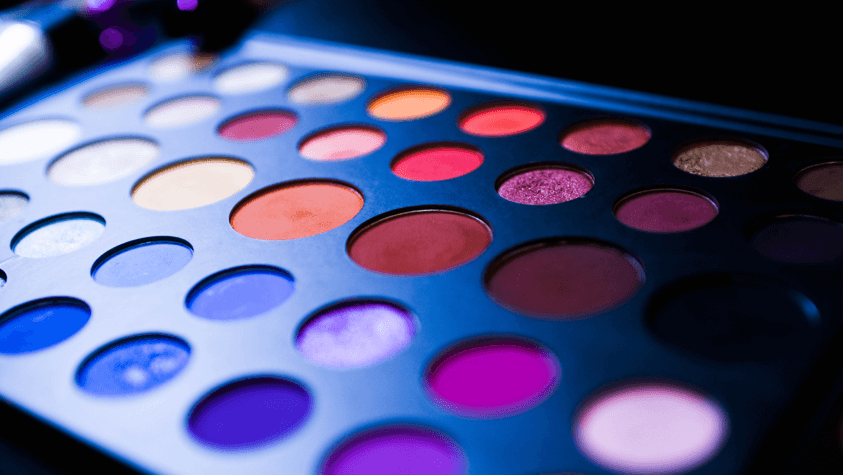
Top education options for a career in the Arts.
High paying art jobs and lucrative careers in art are available, if you know where to look!
Last Updated: February 01, 2023

Professional makeup artists are some of the most in-demand artists in the entertainment industry today. If you have an artistic eye, a good sense of color, a love of makeup, and a passion for self-expression, this demanding field may be the right fit for you.
Makeup artistry is a highly creative and interesting career that allows for artistic freedom and self-expression via a living canvas. This extremely competitive field demands that aspiring artists have plenty of experience, a strong work ethic, and connections to the performing arts/stage or entertainment industry.
A makeup artist is someone who knows how to use a wide variety of cosmetic techniques and processes to create beautiful scenes on the human body. This work should either enhance a subject’s appearance, or in the more extreme sense, create imaginative characters and special effects for film, television, theater, and in photography. Currently, two main industries employ most makeup artists – cosmetic/fashion makeup and theatrical/film makeup.
Whatever path is chosen, both cosmetic and theatrical makeup artists must learn to how to work with the different lines and angles of the face and body, different lighting conditions, high definition cameras, and in many cases, a design team that may consist of directors, fashion designers and more. Each state has different requirements to become a certified makeup artist. Some require special licensing, while others may only require certain certifications. While a degree is not required for this career path, education will be beneficial depending on which area of makeup artistry you are interested in pursuing.
According to the US Bureau of Labor Statistics, makeup artists in theater and performance make a median wage of $44,310 per year. Professionals in the field with years of experience and a stellar reputation can make upwards of $115,000. The motion picture and video industries employ the highest levels of makeup artists, with personal care services, performing arts companies, and radio and television broadcasting companies following closely. It should also be noted, that you may have to go where the work is, as California, Nevada, and New York employ the most makeup artists in the US. But wages are highest in California, New York, and Georgia.
To become a successful makeup artist, a deep love for cosmetics and a passion to transform an art form is essential. If this is your desire, it is important that you work to learn about and continuously develop formal concepts, methods, theory, and techniques that are relevant to this creative field.
Self-expression with makeup is something that humans have relied on for centuries, and as a makeup artist, you can create meaningful, frightful, clever, dramatic, and imaginative looks with makeup. The conception process allows makeup artists to come up the ideas that drive each piece of work. These concepts should serve as the underlying purpose or concept behind each finished face or body design. When you have a strong formal concept, you should be able to choose the right colors, application processes, and any accessories needed to enhance that design. As a makeup artist, you should also possess a clear understanding of colors, shapes, the lines of the face and body, texture, and lighting.
Design methods for each makeup artist may differ, but can be broken down to who you’re designing for, what look is needed to portray a certain idea, where are they going, how is the makeup used, and how can you execute each design accurately? During the design process for each new makeup look, you may be required to conduct research, go through an ideation process, create mockups and sketches, and finally, present your finished work.
Makeup artists often work with a design team made up of fashion designers, set dressers, photographers, directors, and more to create concepts and designs. Makeup artists have the option of taking classes to develop their skills or to begin working as a freelancer with friends and connections in the industry. If you choose to attend college, which is the preferred way to gain a foothold in this industry, you will take a variety of classes, which may include safety, skincare, hygiene, and sanitation; principles of makeup for beauty and fashion; corrective makeup techniques; makeup for broadcast and photography lighting; special effects and film makeup; and application techniques for lips, brows, and all-over body.
Makeup artists must work with different products, tools, textures, colors, shapes, and the human form to create each look. To excel in this field, a good sense of color theory is necessary to create the best color scheme for your clients’ needs. Each makeup artist must have a firm grasp of the basics of color and an understand how lighting affects the appearance of color to the naked eye or through high-definition cameras that are often used within the industry. A solid understanding of color theory will better guarantee that you can make the right judgment call for each creative design, and ultimately, your customer.
With a strong understanding of color theory and the skill it takes to apply makeup to a human canvas, makeup artists can set themselves apart from a makeup applicator. Expert knowledge of different skin types, tool options, makeup products, the lines and shapes of the face, lighting, and application are all needed to succeed. After all, you may know color and have a grasp on the industry, but if you can’t apply the makeup as requested, then you won’t go far in this field.
When pursuing a career as a professional makeup artist, it is important for beginners to build a strong portfolio, a personal brand, and industry connections. Building your portfolio, whether it is digital or in print, is a vital first step in building a career as a makeup artist. With a strong portfolio showcasing your work and growth, you are more likely to be accepted for an internship and book work within the industry. Include photos of makeup you’ve applied while working or volunteering at a local theater group, or on friends and family. Keep your portfolio fresh and up-to-date, as makeup techniques change, and you will be required to remain innovative and diverse in your skills.
With modern advancements in communication and technology, it is more important than ever before to begin working on your own personal brand early on in your career. While it is always a good idea to let your finished work speak for your skill level, becoming recognized for your own personal style and flair can also be beneficial for jump-starting your career. Brand identity —whether you are utilizing social media or connections locally— is key to success.
The professional makeup artistry field is extremely competitive and making connections within the industry via school, internships, or even personal relationships is indispensable to your future. While many new makeup artists are unsure of where to begin making these connections, it is always a good idea to practice by seeking out smaller jobs, possibly on a local or state level, to start building your reputation in the industry.

The Art Career Project is a trusted resource for emerging and professional artists.